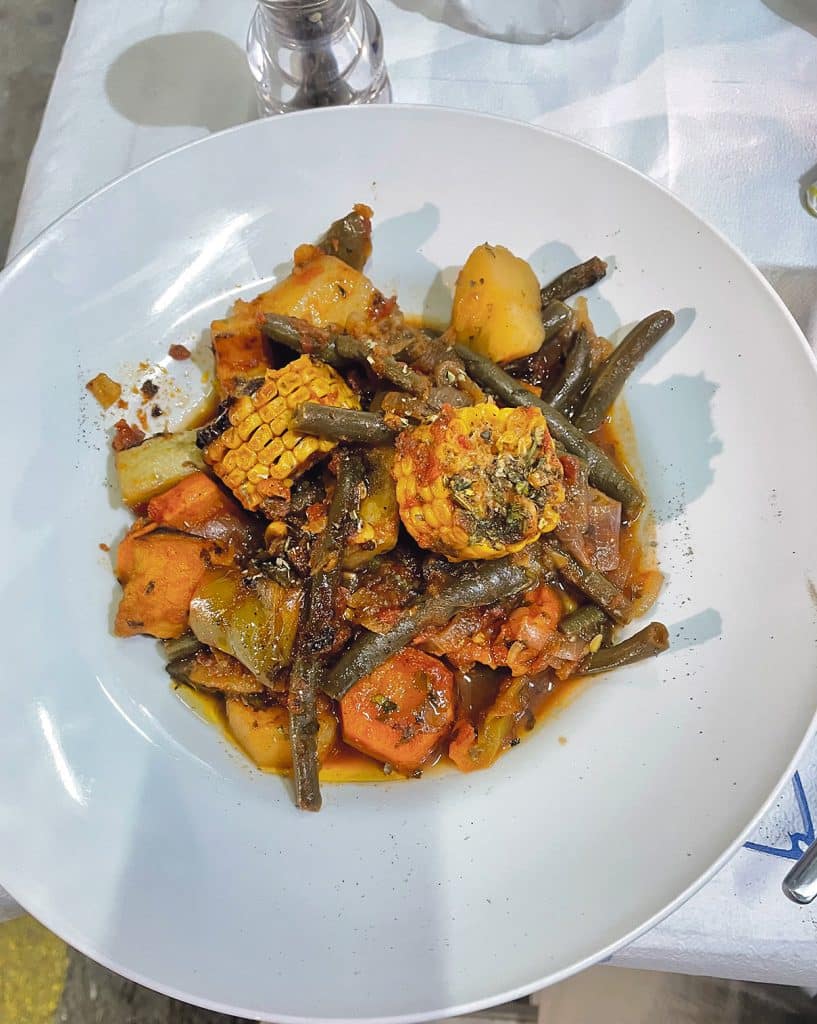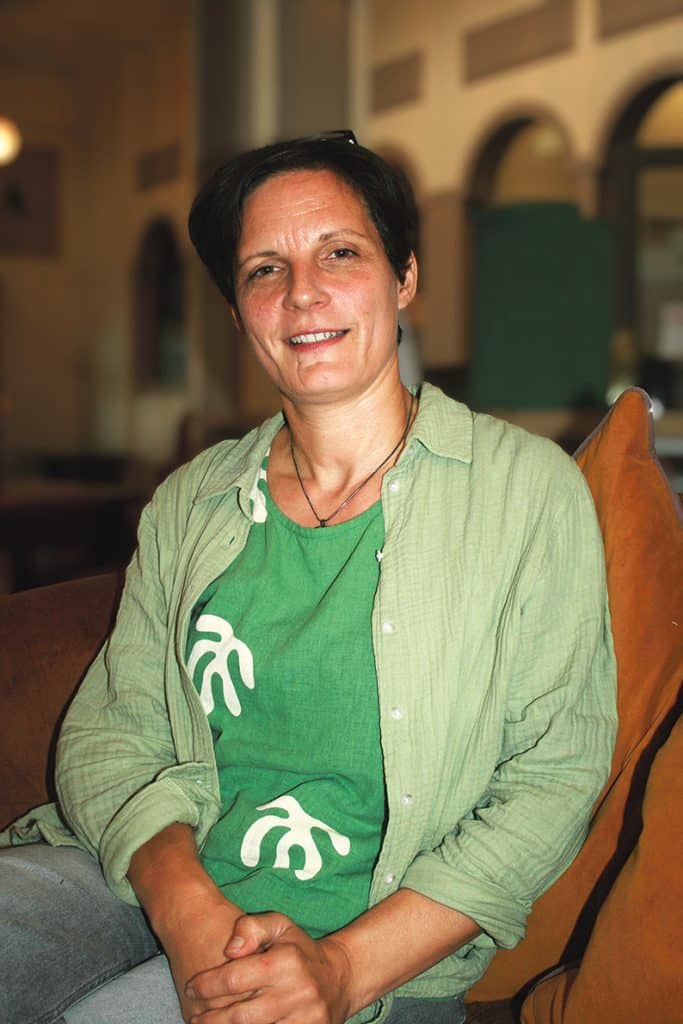At this moment we’re sitting in the airport awaiting our direct flight from Izmir to Cork. This wasn’t planned but as we wandered around some of the Greek islands we realised we were very close to Turkey, closer than the twelve-hour ferry ride back to Athens and a direct flight to Cork is always a treat. We have hopped from Piraeus to Syros, then to Ikaria, onto Samos and finally we took a small ferry in very rough seas to Kusadasi in Turkey. There’s an enormous fleet of ferries shuttling people between the islands, it’s like a twenty-four hour bus service.
We’ve been travelling for the past few weeks, starting off in Syros where we hosted a cooking class with our friends Kostas and Elisa. We had decided to visit Ikaria after the class; it’s place that I’ve become very curious about, as it is known as one of the blue zones of the world where people live extraordinarily long lives. One in three people live to be more than ninety in Ikaria with many living on to become one hundred or more.
We arrived to Ikaria on a night ferry, It was dark when we arrived but the place was buzzing, as the ferry efficiently decanted the arriving passengers and all the cargo onto the very small dock, loaded up the departing passengers and disappeared back into the night.
We awoke the following morning in Evdilos, the small town at the port. It was very quiet, as if all the people had gone underground. It’s about the size and geography of Baltimore, except the harbour wall has been extended to accommodate the twice-weekly ferry when it swings in and out. There are a few tavernas, a mini-market, pharmacy, hardware store and the obligatory travel agent selling ferry tickets. There are also a few shops catering for tourists but they are closed as it’s the end of the season.
The geography of Ikaria is unique, as back in the day, rather than building settlements and fortifications for protection from pirates and marauding Turks, the Ikarian’s used camouflage and remoteness to hide from danger. The villages are tiny and are more a gathering of houses than commercial centres.
Around the island there are great neolithic boulders precariously perched on top of hills, some of which were converted to houses by building in the crevasses and old houses are roofed with large slices of rock; in fact some old houses have one massive rock for a roof. This definitely makes them difficult to spot.
There are only 8,600 people living on Ikaria, which is a large, rugged island with 160kms of coastline. It is more or less covered by the mountain of Atheras, which traverses down the middle of the island with plenty of ravines, gorges and the odd basin stretching down the sides. In general, this means if you want go anywhere, you have to go up before you can go down to get to where you want go to. There are some new coastal roads but, as settlements are scattered, most destinations follow the ‘go up, then come down’ rule. It takes a long time to get anywhere but we weren’t in a hurry.
We explored using the network of stony paths and donkey trails that cross the island, tromping through fragrant rosemary, sage, thyme and oregano. Everything is lush, especially as it had been raining. Right now the trees are dripping with oranges, apples, pomegranates, quince, chestnuts, olives and strawberry trees with the prettiest fruits. The grapes have been harvested and now the olives are being picked. And someone somewhere is growing a fantastic crop of broccoli because we keep seeing people wandering home with great big heads of it.
The diet in Ikaria is mostly plant-based with very little meat. The main foods are fruit, vegetables, beans and lentils and plenty of olive oil. Potato consumption is a considerable part of the menu. Any dairy is usually from goats and sheep and mostly consumed in the form of yoghurt or feta type cheese. Fast food is non-existent, the closest thing to a burger that we saw was the ‘goat on a boat’ which was stewed goat on a bun.
There are more than 300 Greek Orthodox churches dotted around the island and lots of feast days are observed, which bring the community together and are always a good excuse for a party. The religious holidays start with fasting, then end with singing, dancing and feasting.
Most Ikarians are not dependant on tourists to make an income; there’s enough local work to keep everyone ticking over – farmers, fishermen, mechanics, bakers – and life goes on in it’s own particular way, with shops opening when the owner fancies, often not until the sun goes down. Time has its own rhythm…no haste, worries and stress.
Is this the reason for longevity? What makes it so different from the rest of the world? Or indeed the rest of the Greek islands, which also have lots of steps, hills, churches and spinach pies.
The community is very evident, as each evening, when everyone comes out, the children are buzzing around on scooters and bikes whilst the adults sit and discuss life and the state of the world. Everything passes by quite slowly and people are not stuck to their phones; they sit around chatting to each other. There’s also plenty of physical activity with all the ups and downs; the plant-based diet, regular fasting, and lack of stress also adding to this healthy lifestyle.
The biggest thing that stood out for me was the copious amounts of water everyone drank. A big glass of water is always provided when you sit down; before the menu even appears a bottle is plonked on the table or your glass refilled when empty. For sure water flushes out the system and with all of the junk and medication that a lot of us consume that has to be a good thing. Considering that water is widely available and cheap, I think it’s a habit that’s worth adopting. Who knows, it could be the secret and it’s free to try. That and plenty of movement.The diet really suited me as a vegetarian, as there was plenty of choice, lots of salads, mezze and vegetable stews. Everything is made with seasonal produce, as anything not grown on the island has to be shipped in.
Here’s a recipe for Mageirio, a green bean and sweetcorn stew. It’s very simple, basically vegetables braised in olive oil. The photo’s a bit dodgy, as we ate outside in the evenings but it gives the general idea.

Mageirio – Ikarian Vegetable Stew
Ingredients:
• 100mls olive oil + extra to drizzle
• 2 onions, red or yellow
• 3 cloves garlic
• 500g green beans
• 2 green peppers
• 1 aubergine
• 2 ears of corn – frozen will do
• 1 big or 2 small sweet potatoes
• 3 ripe tomatoes chopped or 1 can tomatoes, chopped
• 400mls veg stock or water
• 1 tsp dried oregano
• Freshly chopped mint and/or parsley to serve
Method:
Peel and roughly chop the onions. Top and tail the green beans.
Peel and chop the garlic. Chop the sweetcorn into 3-4 pieces.
Deseed and roughly chop the peppers.
Chop the aubergine into decent sized chunks.
Peel the sweet potato and chop into chunks.
Chop the ripe tomatoes if you have some – otherwise it’s better to use a can.
Put a large pot on the heat, then add the olive oil and the chopped onions. Cook the onions on a medium heat until they begin to melt down, then stir in all the other vegetables except for the tomatoes. Cook for a few minutes until the vegetables are all coated in olive oil. Season with a little salt and pepper then stir in the vegetable stock/water and the chopped tomatoes. Bring to the boil. Add a little more water if it’s too dry – not too much, as the vegetables should not be swimming. Stir in the dried oregano then simmer stirring carefully the odd time to prevent it from sticking. Cook for roughly 40-45 minutes, until the vegetables are tender.
Stir in the freshly chopped herbs and serve warm or at room temperature with a little more olive oil drizzled on top.
It’s definitely time to put my socks on!
Happy November!
Karen
Lettercollum Kitchen Project,
Timoleague
info@lettercollum.ie
www.lettercollum.ie
023 8846251



